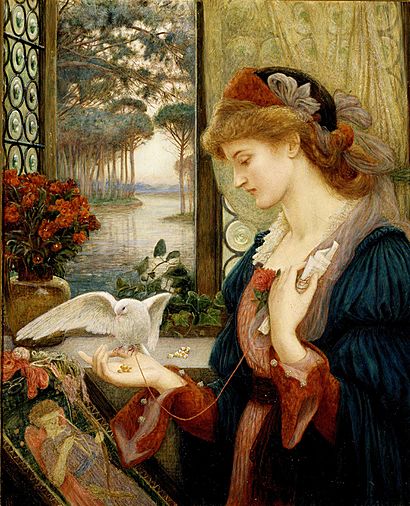Love's Messenger facts for kids
Quick facts for kids Love's Messenger |
|
|---|---|
 |
|
| Artist | Marie Spartali Stillman |
| Year | 1885 |
| Type | watercolor basic |
| Dimensions | 81.3 cm × 66 cm (32.0 in × 26 in) |
| Location | Delaware Art Museum, Wilmongton |
Love's Messenger is a beautiful watercolor painting from 1885. It was created by an artist named Marie Spartali Stillman. The painting shows a woman standing by an open window. A dove has just flown in, carrying a love letter for her.
The woman in the painting wears a red rose. She has just put down her embroidery, which shows a blindfolded Cupid. The artist, Marie Spartali Stillman, once said that the idea for the painting came from seeing a person's head in a special round window. She also mentioned that she painted the background, which looks like the Villa Borghese gardens in Rome, while she was in Italy.
A critic named Jan Marsh thinks the studio with the round window might have been in Edward Burne-Jones's house in Fulham, London. The painting was bought in 1901 by Samuel Bancroft. Today, you can see Love's Messenger at the Delaware Art Museum.
Contents
Understanding the Painting's Meaning
Love's Messenger shows the influence of two important art styles. These are the early Pre-Raphaelite paintings and Italian Renaissance painting. The artist used many symbols in the artwork.
Symbols in the Artwork
The painting includes several symbols that add to its story.
- The dove and the rose are often linked to Venus, the Roman goddess of love.
- The ivy plant often stands for loyalty and lasting love.
- The blindfolded Cupid is Venus's son. He is known for shooting arrows that make people fall in love.
These symbols together suggest ideas like loyalty, faithfulness, and beauty. However, they can also hint at beauty that might fade or the unexpected pain that love can bring. The painting might show a contrast between the beauty of Venus and the sometimes unpredictable nature of her son, Cupid.
History of the Painting
Love's Messenger was first shown to the public in London in 1885. It was displayed at the Grosvenor Gallery. This gallery was very important for Marie Spartali Stillman's art. Love's Messenger is considered one of her most important works shown there in the 1880s.
Where the Painting Has Been Displayed
The painting was bought by Samuel Bancroft, Jr. in 1901 for £100. He saw it at the home of the artist's daughter, Effie Stillman. After he bought it, the painting was shown in Philadelphia in 1901.
In 1935, Samuel Bancroft, Jr. gave the painting to the Delaware Art Museum. At that time, the museum was known as the Wilmington Society of the Fine Arts. Since then, Love's Messenger has been displayed in other cities too. These include Washington (1977), Richmond (1982), and New Haven (1996).
 | Roy Wilkins |
 | John Lewis |
 | Linda Carol Brown |

